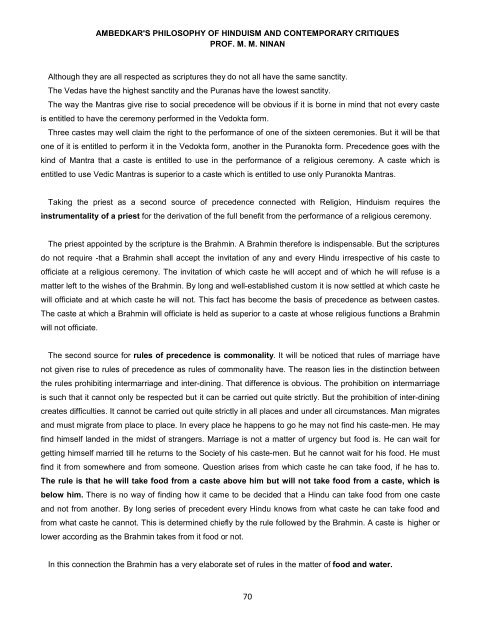Ambedkar-Philosophy of Hinduism
You also want an ePaper? Increase the reach of your titles
YUMPU automatically turns print PDFs into web optimized ePapers that Google loves.
AMBEDKAR'S PHILOSOPHY OF HINDUISM AND CONTEMPORARY CRITIQUES<br />
PROF. M. M. NINAN<br />
Although they are all respected as scriptures they do not all have the same sanctity.<br />
The Vedas have the highest sanctity and the Puranas have the lowest sanctity.<br />
The way the Mantras give rise to social precedence will be obvious if it is borne in mind that not every caste<br />
is entitled to have the ceremony performed in the Vedokta form.<br />
Three castes may well claim the right to the performance <strong>of</strong> one <strong>of</strong> the sixteen ceremonies. But it will be that<br />
one <strong>of</strong> it is entitled to perform it in the Vedokta form, another in the Puranokta form. Precedence goes with the<br />
kind <strong>of</strong> Mantra that a caste is entitled to use in the performance <strong>of</strong> a religious ceremony. A caste which is<br />
entitled to use Vedic Mantras is superior to a caste which is entitled to use only Puranokta Mantras.<br />
Taking the priest as a second source <strong>of</strong> precedence connected with Religion, <strong>Hinduism</strong> requires the<br />
instrumentality <strong>of</strong> a priest for the derivation <strong>of</strong> the full benefit from the performance <strong>of</strong> a religious ceremony.<br />
The priest appointed by the scripture is the Brahmin. A Brahmin therefore is indispensable. But the scriptures<br />
do not require -that a Brahmin shall accept the invitation <strong>of</strong> any and every Hindu irrespective <strong>of</strong> his caste to<br />
<strong>of</strong>ficiate at a religious ceremony. The invitation <strong>of</strong> which caste he will accept and <strong>of</strong> which he will refuse is a<br />
matter left to the wishes <strong>of</strong> the Brahmin. By long and well-established custom it is now settled at which caste he<br />
will <strong>of</strong>ficiate and at which caste he will not. This fact has become the basis <strong>of</strong> precedence as between castes.<br />
The caste at which a Brahmin will <strong>of</strong>ficiate is held as superior to a caste at whose religious functions a Brahmin<br />
will not <strong>of</strong>ficiate.<br />
The second source for rules <strong>of</strong> precedence is commonality. It will be noticed that rules <strong>of</strong> marriage have<br />
not given rise to rules <strong>of</strong> precedence as rules <strong>of</strong> commonality have. The reason lies in the distinction between<br />
the rules prohibiting intermarriage and inter-dining. That difference is obvious. The prohibition on intermarriage<br />
is such that it cannot only be respected but it can be carried out quite strictly. But the prohibition <strong>of</strong> inter-dining<br />
creates difficulties. It cannot be carried out quite strictly in all places and under all circumstances. Man migrates<br />
and must migrate from place to place. In every place he happens to go he may not find his caste-men. He may<br />
find himself landed in the midst <strong>of</strong> strangers. Marriage is not a matter <strong>of</strong> urgency but food is. He can wait for<br />
getting himself married till he returns to the Society <strong>of</strong> his caste-men. But he cannot wait for his food. He must<br />
find it from somewhere and from someone. Question arises from which caste he can take food, if he has to.<br />
The rule is that he will take food from a caste above him but will not take food from a caste, which is<br />
below him. There is no way <strong>of</strong> finding how it came to be decided that a Hindu can take food from one caste<br />
and not from another. By long series <strong>of</strong> precedent every Hindu knows from what caste he can take food and<br />
from what caste he cannot. This is determined chiefly by the rule followed by the Brahmin. A caste is higher or<br />
lower according as the Brahmin takes from it food or not.<br />
In this connection the Brahmin has a very elaborate set <strong>of</strong> rules in the matter <strong>of</strong> food and water.<br />
70


















